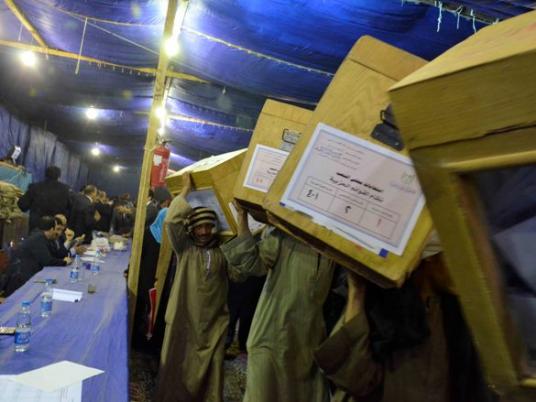
Preliminary results from the first phase of Egypt’s elections show that the Salafi-led Nour Party could take the second-largest number of seats behind the Muslim Brotherhood’s Freedom and Justice Party (FJP) in the next parliament.
The initial results announced by the High Elections Commission show that the Nour Party reaped 20 percent of the votes on electoral lists in the first round of the 3-part parliamentary poll.
Islamists were always expected to win the largest number of votes, given the Brotherhood’s long history as an opposition movement in Egypt and strong level of organization. But the Nour Party’s first round results have exceeded expectations.
The party’s Cairo-based spokesperson Mohamed Nour tells Al-Masry Al-Youm that his party was initially expecting 15 percent of the vote.
“We have a popular base, but have poor funding and campaigning skills. There are also many scare campaigns against our party,” he says. These supposed weaknesses, however, did not seem to deter voters from supporting it.
Nour adds that there were no surprises in terms of the party’s popularity geographically.
Picking up on this point, Ashraf al-Sherif, a professor at the American University in Cairo (AUC) who specializes in political Islamist movements, says, “The Nour Party had a strong showing in the first round because votes were cast in its strongholds.”
Sherif says that by the end of three rounds of voting, he expects the Nour Party will secure between 15 to 20 percent of the vote.
“People voted for them for religious reasons and because they are very local. They have accessibility in local networks and a local vocabulary that can be easily understood,” he continues. “Politics is about visibility and presence, which you get with the FJP and Nour and not with the liberal parties.”
The Nour Party (meaning “The Light” in Arabic) was established in the wake of the 25 January uprising, and is the largest of Egypt’s three licensed Salafi parties, the other two being the Asala and Fadila parties. Nour was officially approved in June.
The party was originally established by Al-Dawa al-Salafiyya (“The Salafi Call”), Egypt’s largest Salafi movement. The movement originated in Alexandria, where it has a significant following.
Salafis are mainly concerned with the Islamic identity of the country, and call for applying Sharia law — the moral and religious code of Islam — in all aspects of life.
The party and movement’s support base is considered to be poor and working-class, and their popularity can be attributed to the fact that Salafis, like the Brotherhood, offer many free social and religious services.
In a country where at least 40 percent of the population is considered poor, this is a significant factor, especially following the years of corruption that marked the rule of former President Hosni Mubarak.
“People who vote for Nour are doing so for pious reasons and the issue of corruption,” Ashour Hamed, a Cairo-based businessman and supporter of the Brotherhood, says.
Hamed says the Nour Party and Salafis “are not experienced politically,” and as a businessman he fears their extreme level of conservatism. He does not think the same of the FJP, which he voted for and considers more business-friendly and politically savvy.
The Brotherhood is considered to have a significant support base among the middle and upper classes, and has the support of key businessmen such as Brotherhood Deputy Chairman Khairat al-Shater.
Many are wondering what the relationship will be like between these two Islamist parties in parliament, whose main task will be to pick a constituent assembly to write Egypt’s new constitution.
“Either the Salafis will pressure the Brotherhood into a more conservative position with regards to the Islamic identity of the country, or the more likely scenario is that the Salafis will be marginalized,” says Sherif, the AUC professor.
Sherif also believes that ultimately, the rules of the game will be determined by the SCAF.
“The SCAF will engineer the final elections results, because the list-based system and complex rules of voting allow this. It is designed to prevent any majorities in parliament,” he contends.




